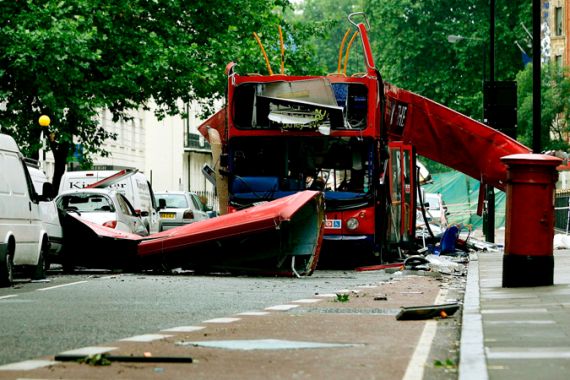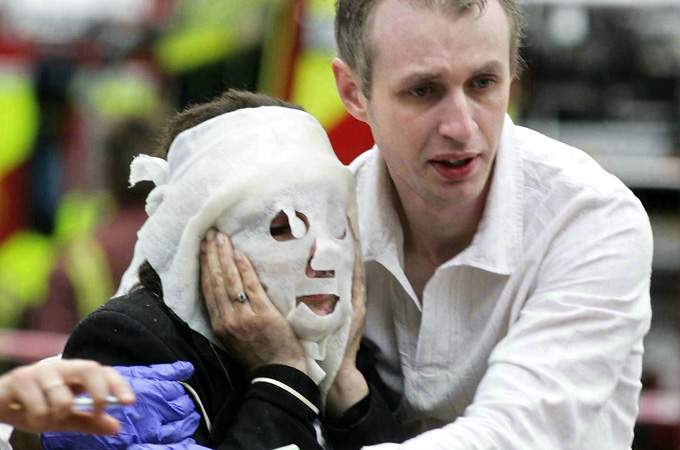London bombings victims ‘unlawfully killed’
Judge says intelligence and emergency service failings were not responsible for deaths of 52 people in 2005 attack.

 |
| 52 people and around 700 others were injured when four suicide bombers attacked the city’s transport system [AFP] |
A British coroner has ruled that the 52 victims of the July 7 bombings on London’s transport network were unlawfully killed “in a dreadful act of terrorism”.
Judge Heather Hallet told a London court on Friday that no failings on the part of any organisation or individual contributed to the deaths, a verdict that may disappoint some victims’ families.
“I am satisfied on the balance of probabilities that each of them would have died whatever time the emergency services had reached and rescued them,” she said.
The verdict into the 2005 bombings on three underground trains and a bus came after a five-and-a-half-month inquest into the incident, and days after the death of Osama bin Laden, the al-Qaeda chief.
In Britain, inquests are fact-finding inquiries held whenever a person dies violently or under unusual circumstances. They cannot establish civil or criminal liability, but their recommendations to prevent future deaths carry considerable weight.
Secret Services criticised
Hallett made nine recommendations which may “save lives” in the future, although relatives had asked her to make 32, including some relating to the alleged failure by intelligence agency MI5 and the police to stop the attack.
She said all agencies involved in the response were guilty of lapses in procedures to deal with such an attack, such as shortages of first aid supplies, using radios that did not work underground and confusion over how to react.
The judge cleared domestic intelligence of responsibility for the attacks, but criticised the “dreadful” editing of a picture of two of the bombers, taken in 2004.
A cropped black-and-white image of Mohammad Sidique Khan, the plot leader, was meant to be shown to al-Qaeda supergrass Mohammed Junaid Babar, who had met the British jihadist at a training camp in Pakistan.
Some believe had he identified Khan then, authorities may have been able to prevent the attacks.
But he was never shown the picture, because the quality was so poor.
Victims’ relatives have said Theresa May, Britain’s interior minister, must review the “whole operation of the Security Services” based on the findings.
“It really must compel Theresa May to review the whole operation of the Security Services in the UK, not just MI5,” Graham Foulkes, who lost his 22-year-old son in the bombings, told the Press Association.
John Taylor, whose daughter Carrie was killed, said MI5 had adopted an “arrogant attitude” about the inquest.
“The warning signs were there after 9/11. I feel personally that after one year, a year and a half, two years, we got complacent and I fear that will happen again.
“[Osama] bin Laden may be dead, but others will come and take his place. Individuals in this country will act on their own initiative.
Hallet said she believed that the hearings had successfully examined MI5 material relating to their investigations of the bombers before the attack took place.
“To my mind, the concerns that I would not be able to conduct a thorough and fair investigation into the security issues in wholly open evidential proceedings have proved unfounded,” Hallet said.
Pamela Bond, whose son Jamie Gordon was killed in the attack, told Al Jazeera the inquest has been a healthy process for the families but that “the emergency services need to do better. It’s taken a tragedy to find the weak spots”.
Some victims’ families say only a full public inquiry can uncover all the details of the attacks, but Hallett said that would not be necessary.